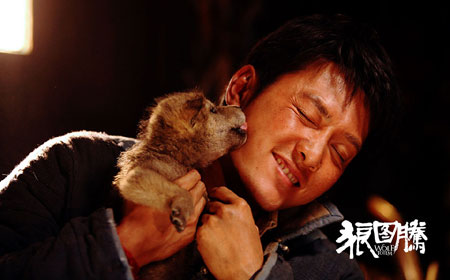|
|
|
|
|
|
|
|
Wolf Totem |
|
|
|

William Feng and his furry pal in Wolf Totem. |
|
|
Chinese: |
狼圖騰 |
|
|
|
Year: |
2015 |
|
|
|
Director: |
Jean-Jacques Annaud |
|
|
|
Producer: |
Jean-Jacques Annaud, Xavier Castano, La Peikang, Bill Kong |
|
|
Writer: |
Jean-Jacques Annaud, Alain Godard, Lu Wei, John Collee, Jiang Rong (original novel) |
|
|
Cast: |
William Feng, Shawn Dou, Ankhnyam Ragchaa, Basen
Zhabu, Yin Zhusheng, Baoyingexige, Tumenbayar, Xilindule, Bao Hailong |
|
|
The
Skinny: |
An engaging if unremarkable frontier epic, Wolf Totem works on a universal level while mostly sidestepping politics, the Cultural Revolution or anything else that might cause China critics to take notice. The actors are fine but the wolves are better. China’s 2016 Academy Awards representative. |
|
|
|
|
|
|
Review
by Kozo: |
What a difference eighteen years makes. Once banned from China for the 1997 Hollywood film Seven Years in Tibet, French filmmaker Jean-Jacques Annaud directs a film for China with the frontier epic Wolf Totem. Based on a novel by Jiang Rong, the film is not Annaud’s first step into Chinese film’s good graces, as he served on the jury of the Shanghai International Film Festival in 2012. There’s a story there, having to do with the China film industry’s growing power, Annaud’s experience with animals (he directed the 1988 adventure The Bear), and probably his networking skills, but this is a film review and should concentrate on, I dunno, maybe the film itself and not behind-the-camera politics. And as a film, Wolf Totem provides engaging and picturesque entertainment if little in the way of innovation. Also: prairies and wolves, for fans of either or both.
In 1967, during the beginning of the Cultural Revolution, Chen Zhen (William Feng, not playing Bruce Lee’s role from Fist of Fury) and Yang Ke (Shawn Dou) are intellectuals who sent to the Mongolian prairies to teach the nomads while also learning to be good, hard-working proletariats. Integrating quickly into their assigned tribe, Chen and Yang are soon asked by the local cadre of the People’s Liberation Army (PLA) to help exterminate the local wolf pack, which is endangering the PLA’s horses and sheep. The process includes the unfortunate killing of wolf cubs, but Chen captures one cub to personally raise in secret. His time in the country, not to mention a harrowing escape from some adult wolves, has piqued his interest in the prairie’s resident predators. Unfortunately, Chen’s violation of PLA edict is discovered, while the wolves begin subsequent, intelligent attacks on the human settlements.
Wolf Totem immediately engages with its “man meets nature” storyline, its prairie setting and the wolves, who alternate between cute (the cubs) and threatening (the adult wolves, duh). An early action sequence, following the wolves as they herd unwitting gazelles into a frozen lake, is thrilling and illuminating, and offers a startling glimpse of the wolves’ intelligence. Other aspects of the film are less well-developed. Chen Zhen’s bond with his own wolf isn’t fully explored; while we do see Chen learning to raise his wolf, we don’t experience an emotional connection between the two, and the wolf never becomes much of a character (at least, not as much as some of the antagonist wolves). Also, Chen occasionally appears unsympathetic, as he doesn’t noticeably consider the repercussions of his actions. Another subplot features Chen’s attraction to a married nomad, Gasma (Ankhnyam Ragchaa), but their relationship mostly fulfills plot functions and never becomes that compelling.
Despite these issues, William Feng is a solid lead and gives Jiang Rong’s alter-ego (the novel is semi-biographical) the proper stubborn naiveté. In contrast, Shawn Dou’s character is only a sounding board for Chen Zhen if not merely wallpaper. The elder supporting actors fare well; Basen Zhabu (who kicked ass as Guan Yu in John Woo’s Red Cliff) shows grizzled presence as the tribe leader Bilig, while Yin Zhusheng offers some moral complexity as PLA official Bao Shungui. The film steps into interesting territory with its interactions between intellectuals, nomads and card-carrying communists, but little is really gleamed from that dynamic. Primarily, the film makes a point of how human incursion threatens the natural order – an effective but familiar theme announced plainly in the film’s early going. Still, when Bilig tells Chen Zhen, "You captured a god to turn it into a slave,” his words carry meaningful weight.
Wolf Totem works primarily as a commercial adventure-drama. Technically, the film is top-notch; the visuals are superb, with sweeping vistas and a number of deftly-directed sequences featuring the wolves that create genuine tension. The score from the late James Horner is stirring if occasionally overblown, while the CGI used for the wolves is terrific. Jean-Jacques Annaud goes for more universal themes in Wolf Totem, making the film very accessible to wider audiences. The film could have amounted to much more, given the time period and the cultural setting, but overall it satisfies with its fine production values, easily-digested environmental message and, of course, the wolves, whose dangerous and enigmatic presence gives the film remarkable tension. There are some plot holes and questionable moments, but nothing that’s a deal breaker. Wolf Totem possesses much unrealized potential, but we would be remiss to not recognize everything that it does accomplish.
(Kozo, 9/2015) |
|
|
|
|
|
|
Availability: |
DVD (Hong Kong)
Region 3 NTSC
Edko Films Ltd. (HK)
16x9 Anamorphic Widescreen
Original Language Track
Dolby Digital 5.1 / DTS
Removable English and Chinese subtitles
*Also Available on Blu-ray Disc |
|
|
|
 |
|
|
|
|
|
|
|
|
|
|
|
|
|
|
|
| LoveHKFilm.com
Copyright ©2002-2017 Ross Chen
|
|
|